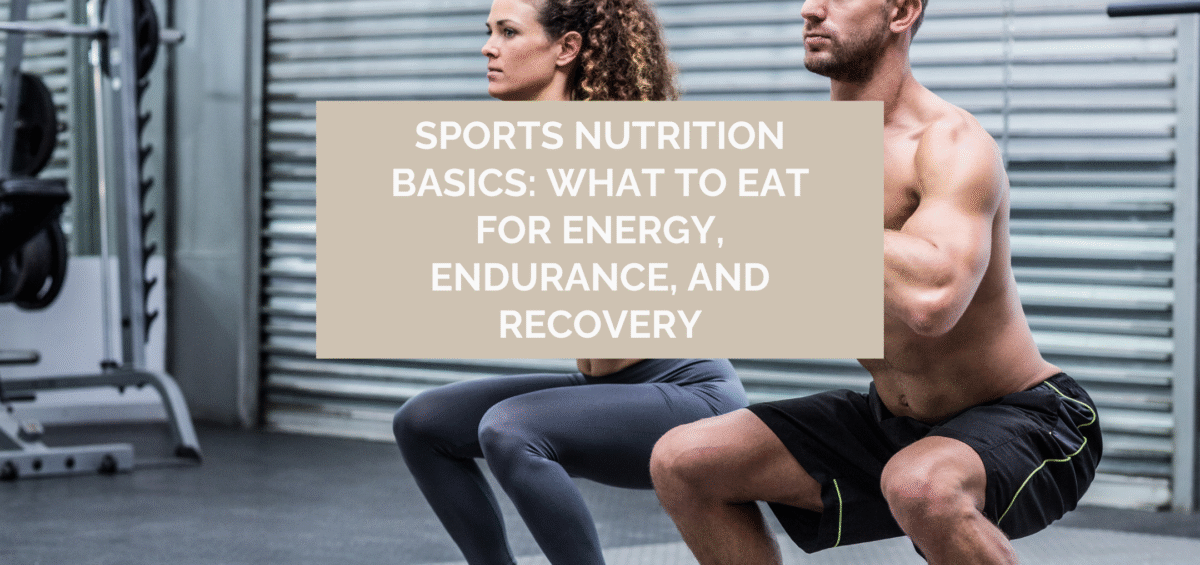Whether you’re training for a fun run, hitting the gym a few times a week, or competing at a high level, one thing remains true: nutrition matters. How you fuel your body can make a noticeable difference to your energy, performance, recovery and even how much you enjoy your training.
As a dietitian, I see many active people doing “all the right things” with exercise but feeling flat, bloated, or constantly sore because their nutrition isn’t keeping up. The good news? You don’t need an overly complicated plan or expensive supplements. Just some solid foundations and consistent habits.
In this blog, we’ll cover the basics of sports nutrition: what to eat, when to eat it, and how to avoid the most common mistakes I see in active people. Let’s get started.
1. Macronutrient Breakdown for Active Bodies
Your body uses three main macronutrients for energy and recovery: carbohydrates, protein, and fats. Each one plays a different but essential role.
Carbohydrates = your main fuel source
Carbs are broken down into glucose, which your muscles use for energy, especially during high-intensity or long-duration training. If you’re low on carbs, your performance will likely suffer.
Great options:
- Wholegrains (oats, rice, pasta, bread)
- Starchy veg (potato, sweet potato, corn)
- Fruit
- Legumes (lentils, chickpeas)
Protein = recovery and muscle repair
Protein is crucial for muscle repair and adaptation after training. It also supports immune function and helps regulate appetite throughout the day.
Aim to include a quality protein source at each main meal and after exercise. Examples:
- Eggs, meat, chicken, fish
- Greek yoghurt, milk
- Tofu, tempeh, legumes
- Protein powders (if needed, for convenience)
Fats = long-term energy and hormone support
Healthy fats help with long-lasting energy, especially during endurance exercise. They also support hormone production, brain function, and absorption of key vitamins.
Healthy fat sources:
- Extra virgin olive oil
- Nuts and seeds
- Avocado
- Fatty fish (like salmon)
2. Timing Your Meals Around Workouts
What you eat and when can have a big impact on your energy levels during training, how well you recover afterwards, and your overall performance. Getting the timing right helps fuel your body, reduce the risk of stomach discomfort, and support muscle repair.
1–3 Hours Before Training
This is your ideal window for a balanced meal or snack that’s rich in carbohydrates, includes a little protein, and is low in fat and fibre to avoid slowing digestion or causing discomfort during exercise.
Good options include:
- Toast with banana and honey
- A bowl of oats with milk and fruit
- Rice with lean chicken and a small serve of vegetables
For athletes managing type 1 diabetes: If eating 2–3 hours before training, some insulin from the meal may still be active during the session. It’s important to consider how this affects blood glucose levels and adjust with your diabetes care team as needed.
30–60 Minutes Before Training
Short on time? A quick, carb-rich snack is better than going in on empty. Aim for something easy to digest and familiar to your body.
Snack ideas:
- A banana
- Muesli bar
- Fruit toast
- Rice cakes with jam
If you use insulin and are eating within 60 minutes of training, speak to your health team about adjusting insulin doses, as your usual bolus may not be necessary.
During Training (if needed)
For longer or high-intensity sessions (especially over an hour), taking in 30–60g carbohydrate per hour can help maintain performance and prevent hypoglycaemia.
- Short sessions: higher GI carbs (e.g. sports drink, lollies)
- Longer sessions: mix of high and low GI carbs (e.g. banana + sports drink)
Carbohydrates may also be needed during exercise even if not performance-critical, especially for those at risk of low blood sugar.
Within 60 Minutes After Training: Recovery Window
This is your best opportunity to replenish your glycogen stores (carbohydrates) and support muscle repair with protein.
Pair carbs and protein in your post-workout snack or meal:
- Chocolate milk
- Greek yoghurt with fruit
- Tuna and rice
- Smoothie with milk, banana, oats, and protein powder
If you’re training again later in the day or doing double sessions, refuelling becomes even more important. Don’t skip this step!
3. Hydration and Electrolyte Tips
Even mild dehydration (as little as 2% of body weight) can impact your performance, concentration, and recovery. Staying hydrated isn’t just about water; electrolytes, especially sodium, play a key role in fluid balance and muscle function.
What to Know:
- Hydrate early: Start your day with water and sip regularly, don’t wait until you’re thirsty.
- Use urine colour as a rough guide: pale yellow usually suggests you’re adequately hydrated, but remember this is only reliable in well-rested individuals and not immediately post-exercise or during heat acclimation.
- Rehydrate after: Weigh yourself before and after longer sessions. 1 kg weight loss = ~1 L fluid lost.
Go beyond water: For sessions over 90 minutes or in heat, include electrolytes (via sports drinks, tablets, or salty foods). - Don’t over drink: Avoid excess fluid intake that causes weight gain post-session, as this can dilute blood sodium levels and increase the risk of hyponatraemia.
4. Common Nutrition Mistakes Active People Make
- Under-eating (especially carbs):
Low energy intake can lead to fatigue, poor recovery, frequent illness, or even loss of menstrual cycles in women (RED-S). If your training has increased, your fuelling needs probably have too. - Overdoing protein shakes:
While convenient, they shouldn’t replace whole meals. Real food provides fibre, vitamins, and minerals that powders don’t. - Skipping recovery nutrition:
Even if you’re not hungry straight after a session, your body needs fuel. Try liquid options like smoothies or milk-based drinks if solids feel hard to stomach. - Training fasted (too often):
While occasional fasted training might have a place, consistently skipping meals before exercise can impair performance, especially for women, and increase stress hormone levels. - Overthinking it:
Nutrition doesn’t need to be perfect to be effective. Consistency > perfection.
Final Thoughts
Fuelling your body well is one of the most powerful ways to support your performance, recovery, and overall well-being. Whether you’re new to training or have been active for years, small changes in nutrition can make a big difference in how you feel and function.
If you’re unsure whether you’re getting it right or you’re noticing low energy, disrupted cycles, or gut issues, it may be time for a tailored approach.
Ready to Fuel Your Training Properly?
At The Wellness Emporium, we support active people with real-life nutrition strategies that work. No gimmicks, no extremes, just practical guidance grounded in science.
Whether you’re looking to improve performance, prevent burnout, or simply feel stronger and more energised, personalised support can help.
Meet Michaela, our Accredited Practising Dietitian, and explore how nutrition can take your training (and your health) to the next level.












Leave a Comment